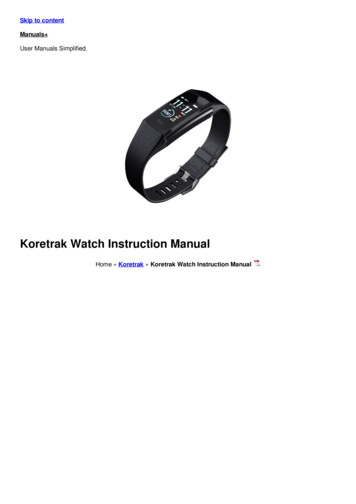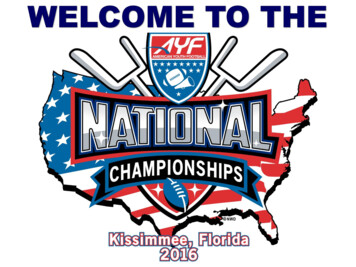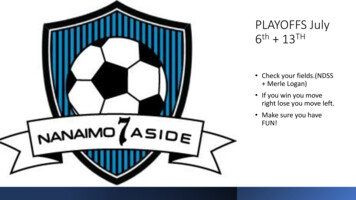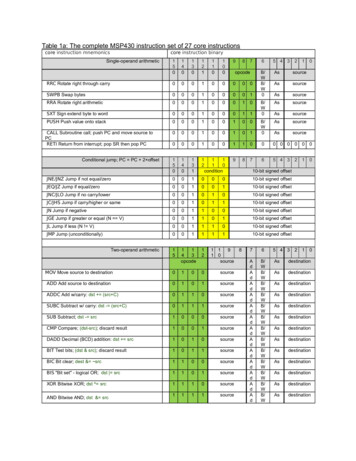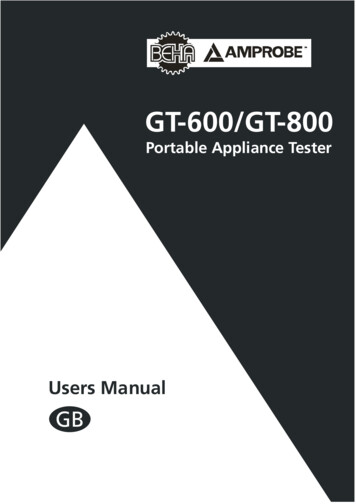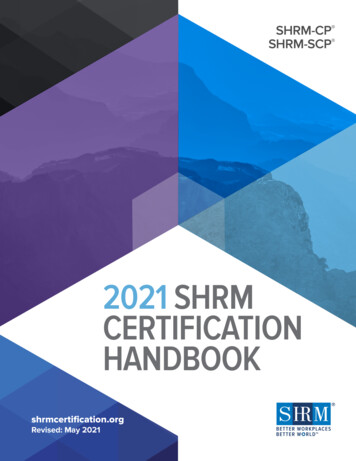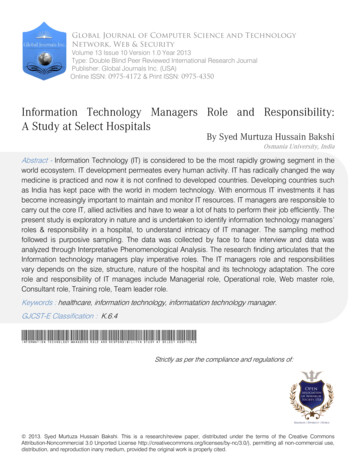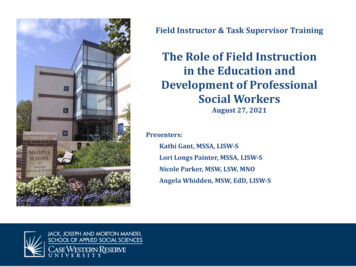
Transcription
Field Instructor & Task Supervisor TrainingThe Role of Field Instructionin the Education andDevelopment of ProfessionalSocial WorkersAugust 27, 2021Presenters:Kathi Gant, MSSA, LISW-SLori Longs Painter, MSSA, LISW-SNicole Parker, MSW, LSW, MNOAngela Whidden, MSW, EdD, LISW-S
It’s Takes A Village!
Mandel School Field Education TeamNicole ParkerAssistant Director of Field Education nmp86@case.eduHenrietta JonesAdministrative Assistant hpj@case.eduField Faculty Advisors Kathi Overmier-Gant, MSSA, LISW-Skxo@case.edu Lori Longs Painter, MSSA, LISW-Sllp14@case.edu Susan Snyder, MSWsusan.snyder@case.edu Jody Timko, MSW, LISW-Sjxt365@case.edu Chenobia Webster, DSW, LCSWcxw463@case.edu Angela Whidden, MSW, EdD, LISW-Saxw433@case.edu
Presentation Overview Training will be recorded. The Role of the Field Practicum in Social Work Education Roles and Responsibilities of Field Agencies, Field Instructors & TaskSupervisors, Students, and Field Advisors Curriculum Integration in Field Education, Competence Developmentand Learning Agreement Supervisory Strategies to Support the Professional Development of SocialWork Students Field Education Resources Wrap-up & Evaluation
MSW/MSSA Degree FormatsMNODegree50% of MSSA studentsOnline10-12 field hours/wkIntensiveWeekend(IW)On-GroundWeekly10-12 field hours/wk20-24 field hours/wk
History of Mandel School Mandel School celebrating 105 years1985 Field Education became a department1987 IW format began2013 Online format began
Quick Facts about Field Education Signature Pedagogy of Social Work– The Council on Social Work Education (CSWE) has designated fieldeducation as the signature pedagogy of social work education– Integral component of our degree curriculum at the Mandel Schoolaccounting for 20% of the curriculum– Similar to medical students residency experiences. Med students makerounds. Active experiential learning component. Affiliations with over 1,000 Field Education Placement Organizations– Placements in Cleveland area and across the country– Substance Use Disorders & Recovery, Children, Youth & Families,Child/Adolescent & Adult Mental Health, Aging, School Social Work,Health, and Community Practice for Social Change.
What do you want to leavewith today?
Breakout GroupsSpend a few moments reflecting on your own experiences as a social workstudent1.Recall some of the positive qualities of your Field Instructor. Whatimpact did those positive experiences have on your growth or futureprofessional development?2.How do your own experiences as a student translate to your current roleas Field Instructor or Task Supervisor? How do these experiences helpto inform your role as a teacher and a mentor?3.What aspects of your work with students are you most looking forwardto? What areas are you concerned about?
Field EducationRoles & Responsibilities
Focus & Intention of Field Education Student’s continuous learning and development as aprofessional social worker An expressed educational purpose that should be plannedand assessed using the Learning Agreement Students are expected to progressively advance learningobjectives & acquire new knowledge and skills Gradual integration into professional practice Educational priority over productivity
Organizational Roles & Responsibilitiesfor Field Education Learning opportunities at micro, mezzo and macro levels ofpractice Learning & practice opportunities within each of the 10competencies at the generalist and specialized levels Opportunities to develop competencies atall stages of the social work process
Orientation and SafetyOrientation: Safety in the Field All students must be provided with policies and an overview of basicsafety & emergency procedures Please don’t assume – students have varying levels ofexperience/exposure Common safety concerns/questions include:– Transporting clients– Home visits– Aggressive clients– Protecting student personal information
Field Instructor Roles & Responsibilitiesfor Field EducationQualificationsSupervisionOrientation / SafetyGuides Learning Agreement DevelopmentParticipate in Field ConferenceEvaluation on Learning AgreementActive Observation/ FeedbackApprove and sign TimesheetsMaintain open dialogue with the student andField Faculty Advisor Interprofessional Education (IPE)
Task Supervisor Roles & Responsibilitiesfor Field EducationNot required to be a Social WorkerProvide daily support to studentHelp to structure students activities and scheduleContribute to Learning Agreement if neededParticipate in Field ConferenceMaintain open dialogue with student, Field Instructor and FieldFaculty Advisor Access to IPT and sign learning agreement.
Student Roles & Responsibilitiesfor Field Education Collaborate with the Field Instructors to develop the Learning Agreementobjectives & evaluation Come to supervision prepared with agenda and questions Communicate relevant field education due dates and timelines to FieldInstructor/Task Supervisor Proactively schedule field conference date & agenda Complete course assignments (Atrio orCanvas), professional educationhours, field education hours, monthly time sheets,and IPE requirements* on time (if applicable) Remain open to constructive feedback and engagedin the learning process Address any concerns, issues, or problems in aprofessional manner
Student Concerns Administrative protocol for addressing student issues in fieldplacement settings Role as educator, part of student’s academic team vs.practitioner Contact/consult Field Faculty Advisor
Student Accommodations Students apply - CWRU Office of Disability Resources Field Instructor & Field Advisor collaboration Written plan specifies accommodations integrated within fieldeducation Accommodations are not retroactive
Field Faculty Advisor Roles & Responsibilitiesfor Field EducationLiaison between the Mandel School, student and community partnerorganization Provide feedback & support throughout the semester Teach field courses and assign field grades Facilitate and participate in field conference Review & sign timesheets Review & evaluate learning agreement Provide learning opportunities for Field Instructors & TaskSupervisors Facilitate and offer consultation in all aspects of the field education Facilitate & evaluate interprofessional education (IPE) **On-ground and Intensive Weekend students only
CURRICULUM INTEGRATION INFIELD EDUCATION
CURRICULUM INTEGRATION IN FIELD EDUCATIONField is the Bridge Between Classroom and Practice
CSWE EPAS 2015Recognizes a holistic view of professional competenceDemonstration ofcompetence isinformed by:KnowledgeSkillsValuesCognitive &AffectiveProcesses
Field Education CurriculumStudents in all formats are enrolled in a Field Education coursewhile in placement. Courses consist of the following:Non Advanced Standing Students Field Education course 4-7 depending on format Organizational Theory and Practice - 2 coursesAdvanced Standing Students Field Education course 2-4 depending on format Organizational Theory and Practice - 1 course
Required Educational OpportunitiesStages of Social Work aluationLevels of Social Work unities
Competency based curriculum
Demonstrate Ethical &Professional BehaviorEngage Diversity & Difference inPracticeAdvance Human Rights & Social,Economic and EnvironmentalJusticeThe TenCompetenciesThe core of bothclassroom and fieldeducation at theMandel School.The MSSA curriculumis structured aroundthe following tencompetencies:Engage in Practice InformedResearch & Research InformedPracticeEngage in Policy PracticeEngage with Individuals,Families, Groups, Organizationsand CommunitiesAssess Individuals, Families,Groups, Organizations andCommunitiesIntervene with Individuals,Families, Groups, Organizationsand CommunitiesTwo Degree ConcentrationsDirect PracticeCommunity Practice for Social ChangeEvaluate Practice withIndividuals, Groups,Organizations and CommunitiesDevelop as a Social Work Leader
The Learning Agreement
Learning Agreement Process123Assigned in Intern Placement Tracking (IPT) System Student and Field Instructor identify 3-6 learning objectives Student develops implementation plans that operationalize objectivesand ensure competence development Learning Agreement as guide and reference tool45 Conclusion of each field period, student and Field Instructor evaluateprogress within each competency
Learning Agreement ObjectivesRepresent the primary tasks and the learning goalassociated with the tasksExamples: Learn to facilitate group by observing and facilitating Learn about sources of funding by attending fundraisingcommittee meetings Learn individual counseling and applying EIP Learn how to conduct a community assessment
The Ten CompetenciesCompetency Area One: Demonstrate Ethical and Professional BehaviorRequired Generalist Behavior1. Make ethical decisions by applying the standards of the NASW Code of Ethics, relevantlaws and regulations, models for ethical decision-making, ethical conduct of research, andadditional codes of ethics as appropriate to context.Sample Learning Agreement Implementation Plan:Review several models for ethical decision making. Select one and apply it to a casescenario within the field setting.Required Generalist Behavior2. Use reflection and self-regulation to manage personal values and maintainprofessionalism in practice situations.Sample Learning Agreement Implementation Plan:Utilize personal self-care and self regulation techniques to help effectively manage achallenging professional interaction. Reflect upon the use of these strategies duringsupervision
Competency Area Four: Engage in Practice-Informed Research andResearch-Informed PracticeRequired Generalist BehaviorUse and translate research findings to inform and improve practice, policy, and servicedeliverySample Learning Agreement Implementation Plan:Research several evidence based practice models. Select a model that is relevant to thepopulations served by the organization. Present findings during supervision and discusshow the model could be best applied to practice.Competency Area Five: Engage in Policy PracticeRequired Generalist BehaviorAssess how social welfare and economic policies impact the delivery of and access tosocial servicesSample Learning Agreement Implementation Plan:Independently research two policies that have or will influence service delivery or accesswithin the organization. Reflect upon and discuss how this has/may influence agencyconsumers, and the potential impacts on individuals, families or communities.
Sample Learning ActivitiesCompetency Six: Engage with Individuals, Families, Groups, Organizations &Communities Practice engagement with a specific population using a solution focused approach Identify, build upon & utilize strengths for improved client engagement Develop a case presentation focusing on engaging with a challenging client scenario todeliver in individual or group supervision and receive feedback from clinical staff andfield instructorCompetency Seven: Assess Individuals, Families, Groups, Organizations &Communities Discuss in supervision the rationale why identified strategies are most appropriate forassessment of the population served by the field agency Practice assessment using an evidence based approach that is applicable to the clientpopulation served by the field agency Provide rationale for the use of specific assessment approach
Sample Learning ActivitiesCompetency Eight: Intervene with Individuals, Families, Groups, Organizations &Communities Use analytical and communication strengths to address barriers to effectiveinterventions Develop a case presentation that focuses specifically on intervention to deliver inindividual or group supervision and receive feedback from clinical staff and fieldinstructor Select and utilize two evidence based treatment interventions. Identify the rationale fortheir use with a specific client or constituencyCompetency Nine: Evaluate Practice with Individuals, Families, Groups,Organizations & Communities Participate in agency evaluation. Critically assess needs and areas of growth based onpopulation served and agency mission Become knowledgeable of interventions and how they are related to the outcomes of theindividuals, families, groups, organizations and communities served by the field agency
Sample Learning ActivitiesCompetency Ten: Develop as a Social Work Leader Use of self, social work identity, Prepare and facilitate a training for field agency staff regarding a top specific to thepopulation served. Serve as liaison for an agency or community-based committee or board, offerperspectives to help inform policy, practice and/or agency performance. Employ creativity, resourcefulness and innovation in the design and delivery of service. Develop a written self-care plan that includes identification of stressors that impact thestudent most. Explore plan in supervision and try to articulate why certain stressorshave a greater impact.
What is the difference betweenfield instruction and work supervision?
Supervisory Strategies
Supportive Adult Student LearningNew lection&DiscussionRepeatedPracticeObservation &Timely ulguidancefacilitatesempowermentAdapted from M.Bogo, 2017
List specificbehaviors,characteristics &skillsSocial work values& ethicsReflection onaction/practiceStudents betterunderstandrationaleMake theimplicit explicitReflectiongrounded inobservationAccurate feedbacksupports learning &skill developmentAdapted from Bogo, 2017
Balancing Supervisory ResponsibilitiesStrategiesProvide consistent weekly supervision timeBalance need to address administrative issues withstudent learning & reflection
Supporting Collaborative Student LearningUnderstandfield educationrequirementsBe creativeStayconnectedSeek outagency supportDeveloprealisticexpectationsTeach and bewilling tolearnBalanceflexibility &structureAdapted from Social Work Today(2012)
Student Values in Field nsistentClear Expectations
Evaluation
Learning Agreement Evaluation RatingsRANK43210RATING SCALERATING SCALE DEFINITIONSConsistently demonstrates an advanced level of competence at the generalist level of socialDemonstrateswork practice. Activities are consistently managed at an advanced level beyond what wouldadvancedbe expected of a generalist level student. The student exhibits advanced levels of relevantcompetence at the knowledge, skills, values, cognitive and affective processes and behavior.GENERALIST levelDemonstrates competent performance at the generalist level. Activities are managed in aDemonstratescompetent manner consistent with what would be expected of a generalist level student. Thecompetence at the student exhibits the appropriate levels of relevant knowledge, skills, values, cognitive andGENERALIST level affective processes and behavior.Developing competence or beginning to perform at the generalist level. Some activities aremanaged in a competent manner consistent with what would be expected of a generalistDevelopinglevel student. The student has not yet demonstrated consistent knowledge, skills, values,competence at thecognitive and affective processes and behavior. Additional training, instruction or supportsGENERALIST levelmay be necessary to promote competence.Demonstrates inconsistent competence and performance at the generalist level. ActivitiesDemonstratesare managed with some difficulty consistent with what would be expected of a student at theinconsistentgeneralist level. The student has not demonstrated performance of relevant knowledge,competence at the skills, values, cognitive and affective processes and behavior. Additional training,GENERALIST level instruction and supports are required to develop competence. Corrective action may beinitiated.Does not demonstrate competence and performance at the generalist level of social workDoes notpractice. Activities are not managed in a competent manner consistent with what would bedemonstrateexpected of a student at the generalist level. The student exhibits substandard levels ofcompetence at the knowledge, skills, values, cognitive and affective processes and behavior. Additional trainingGENERALIST level and corrective action are required.
Field Instructor Narrative Summary Describe methods used to evaluate progress during field period. Describe professional development in skills, values, behavior andcognitive & affective processes necessary for success in practice. Describe specific areas of strength. Describe specific areas for continued growth and development: Additional comments
Resources
Active Shadowing Tools
Field Instructor & Task Supervisor ResourcesField Education d-education Field Education CalendarsField Education ManualStudent and Field Instructor IPT tutorialTraining ResourcesEvents Library emics/harris-library00000000000
Intern Placement Tracking System (IPT)www.runipt.comField Instructor/Task Supervisor accessOrganization/Agency applicationIPT access letter sent by emailLog into IPT to access your page and your studentsinformation All learning agreements and timesheets are located in IPT Forms section Forms signed electronically in IPT Field Faculty Advisors assist with troubleshooting
Student Run Health Clinic Overview Social work, nursing, dental,physician assistant, andmedical students collaborateto provide provide healthcareservices to communitymembers SRHC is held atNeighborhood FamilyPractice (3569 Ridge Rd,Cleveland, OH 44102)
Preceptor Roles, Responsibilities, & RequirementsRole: Essential preceptor role functions include: Consulting with social workstudents and responding to questions after they have met with each client.Requirements: MSW & minimum of LSWVolunteer for a full day of clinic(7:30am-3:30pm) based onavailability.Frequency of volunteercommitment is determined byeach individual preceptor(prefer several Saturdays persemester)Responsibilities: Provide supervision/consultation to socialwork students after completing screeningtools with patientsSupport students in identifying appropriatelocal services to connect patients withMandel School faculty contact: AmyKorsch-WilliamsAmy.korsch@case.edu or 368-4383
Field Education Curriculum ents/field-education-student-resources
Format Specific Breakout Rooms
Online Program Field Information In placement year-round Non-Advanced Standing: 7 semesters of field total, 3 Generalist and 4Specialized Advanced Standing: 4 semesters of field, all Specialized Semesters are 14 weeks long Non-Advanced Standing: Placement change optional for Specialized Learning Agreement: Covers 2 semesters with exception of the first Timesheets: Four per semester, due weeks 4, 8, 12 and 14 Field Conferences: Every other semester. Coincides with completion ofthe Learning Agreement evaluation. Non-Advanced Standing Field Hours: 130 hours per semester, finalsemester 120 hours Advanced Standing Student Hours: By semester 120, 130, 130, 120 Professional Development Hours: 2 per semester
On Ground Intensive WeekendIn placement year-roundNon- Advanced students: 7 semesters total, 2 Generalist and 2 SpecializedAdvanced Standing students- 4 semesters , 2 SpecializedPlacement change optional for SpecializedLearning Agreement: Covers 2 semesters with exception of first LATimesheets: Completed Monthly due MonthlyField Conferences: Every other semester, four total. Coincides withcompletion of the Learning Agreement objectives and implementationplans. Field Hours: 150 hours first term, subsequent terms 250 hours
On Ground Weekly Non Advanced StandingIn placement Fall & Spring4 semesters total, 2 Generalist and 2 SpecializedPlacement change optional moving into SpecializedLearning Agreement: 1 per field period (4 total.)Timesheets: Completed Monthly due 5th of every MonthField Conferences: Mid semester, every semester (four total.) Coincideswith completion of the Learning Agreement objectives andimplementation plans. Field Hours: 150 hours first term, subsequent terms 250 hours IPE/CP1 requirements 3 PD hours
On Ground Weekly Advanced StandingIn placement Fall and Spring2 semesters total, 1 Generalist and 1 SpecializedLearning Agreement: 1 for each field periodTimesheets: Completed Monthly due 5th of every MonthField Conferences: Every semester, 2 total. Coincides with completion ofthe Learning Agreement objectives and implementation plans. Field Hours: 250 hours each field period Professional Development Hours: 3 per field period
Mandel School Field Education StaffHenrietta JonesAdministrative Assistant hpj@case.eduField Faculty Advisors Kathi Overmier-Gant, MSSA, LISW-Skxo@case.edu Lori Longs Painter, MSSA, LISW-Sllp14@case.edu Nicole Parker, MSW, MNO, LSWnmp86@case.edu Susan Snyder, MSWsusan.snyder@case.edu Jody Timko, MSW, LISW-Sjxt365@case.edu Chenobia Webster, DSW, LCSWcxw463@case.edu Angela Whidden, MSW, EdD, LISW-Saxw433@case.edu
THANK YOUYou are the most valuable resource in ourstudents’ field education experiences!CEU LSdcgzaOBp0MOoeJMWBQbU1wtobflTdY883x3B- qzfBqeCuFw/viewform?usp sf FAIpQLScQFJvmw usp sf link
MSW/MSSA Degree Formats Online On-Ground Weekly Intensive Weekend (IW) 10-12 field hours/wk 10-12 field hours/wk 20-24 field hours/wk 50% of MSSA students MNO Degree. History of Mandel School Mandel School celebrating 105 years 1985 Field Education became a department



